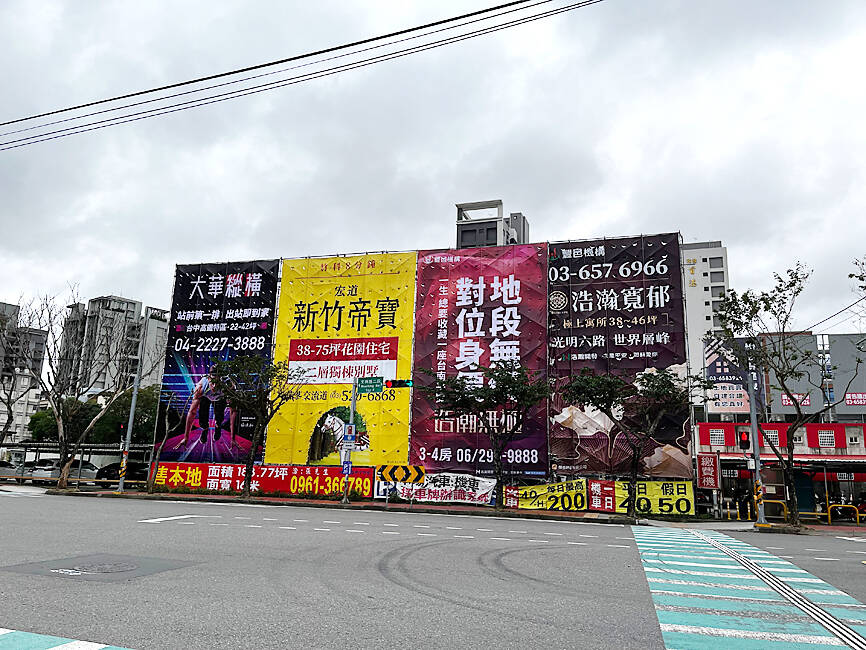Local property developers plan to launch NT$333.93 billion (US$10.16 billion) of new housing projects in northern Taiwan in the spring sales season, a new high despite weak sentiment induced by the central bank’s credit controls, Chinese-language My Housing Monthly (住展雜誌) said yesterday.
That represents an 8.2 percent uptick from the same period last year when the market was heating up, aided by favorable lending terms the government introduced in August 2023 for purchases of first homes.
Some developers are pressing ahead with project releases after setting aside money for reception facilities, media promotions and sales personnel, the magazine’s spokesman Chen Ping-chen (陳炳辰) said.

Photo: Hsu Yi-ping, Taipei Times
The spring sales season begins on March 29 and runs through the end of next month.
Taipei and New Taipei City would be see most of the new project launches, with New Taipei City contributing NT$146.65 billion, more than 40 percent of the overall volume, the magazine found.
New projects are to be launched in rezoning quarters of Banciao (板橋), Sindian (新店) and Sanchong (三重) districts that could generate more than NT$10 billion in sales for developers Shin Ruenn Development Co (新潤興業) and JSL Group (甲山林), it said.
YeaShin International Development Co (亞昕國際開發) and Forward Development Co (馥華開發) are to roll out new projects in Linkou (林口) and Sinjhuang (新莊) districts, it added.
Taipei ranks second by contributing NT$110.25 billion, the magazine said, adding that a project in Nangang District (南港) would bring in about NT$10 billion in potential sales.
There are also smaller projects in Songshan (松山) and Zhongshan (中山) districts that could each generate less than NT$5 billion of sales, it said.
Taoyuan, which delivered a strong performance last year, would be relatively low key, with projected sales of NT$65.38 billion, while potential sales in Hsinchu County would be NT$11.25 billion, the magazine said.

Merida Industry Co (美利達) has seen signs of recovery in the US and European markets this year, as customers are gradually depleting their inventories, the bicycle maker told shareholders yesterday. Given robust growth in new orders at its Taiwanese factory, coupled with its subsidiaries’ improving performance, Merida said it remains confident about the bicycle market’s prospects and expects steady growth in its core business this year. CAUTION ON CHINA However, the company must handle the Chinese market with great caution, as sales of road bikes there have declined significantly, affecting its revenue and profitability, Merida said in a statement, adding that it would

RISING: Strong exports, and life insurance companies’ efforts to manage currency risks indicates the NT dollar would eventually pass the 29 level, an expert said The New Taiwan dollar yesterday rallied to its strongest in three years amid inflows to the nation’s stock market and broad-based weakness in the US dollar. Exporter sales of the US currency and a repatriation of funds from local asset managers also played a role, said two traders, who asked not to be identified as they were not authorized to speak publicly. State-owned banks were seen buying the greenback yesterday, but only at a moderate scale, the traders said. The local currency gained 0.77 percent, outperforming almost all of its Asian peers, to close at NT$29.165 per US dollar in Taipei trading yesterday. The

RECORD LOW: Global firms’ increased inventories, tariff disputes not yet impacting Taiwan and new graduates not yet entering the market contributed to the decrease Taiwan’s unemployment rate last month dropped to 3.3 percent, the lowest for the month in 25 years, as strong exports and resilient domestic demand boosted hiring across various sectors, the Directorate-General of Budget, Accounting and Statistics (DGBAS) said yesterday. After seasonal adjustments, the jobless rate eased to 3.34 percent, the best performance in 24 years, suggesting a stable labor market, although a mild increase is expected with the graduation season from this month through August, the statistics agency said. “Potential shocks from tariff disputes between the US and China have yet to affect Taiwan’s job market,” Census Department Deputy Director Tan Wen-ling

UNCERTAINTIES: The world’s biggest chip packager and tester is closely monitoring the US’ tariff policy before making any capacity adjustments, a company official said ASE Technology Holding Inc (日月光投控), the world’s biggest chip packager and tester, yesterday said it is cautiously evaluating new advanced packaging capacity expansion in the US in response to customers’ requests amid uncertainties about the US’ tariff policy. Compared with its semiconductor peers, ASE has been relatively prudent about building new capacity in the US. However, the company is adjusting its global manufacturing footprint expansion after US President Donald Trump announced “reciprocal” tariffs in April, and new import duties targeting semiconductors and other items that are vital to national security. ASE subsidiary Siliconware Precision Industries Co (SPIL, 矽品精密) is participating in Nvidia